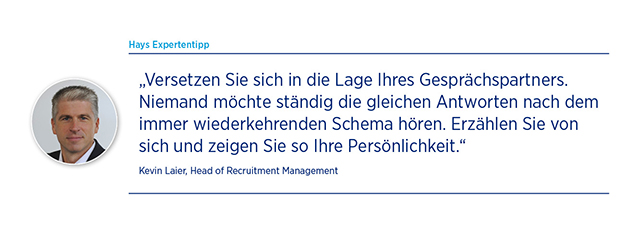CONVINCE WITH STORYTELLING
IN YOUR JOB INTERVIEW
You have spent numerous weeks being interviewed for a new position and have learnt more and more about certain company philosophies? The interviews went well, you have already decided in favour of the company, only to find out that another candidate has been offered this job? Do you know this situation? This can be very irritating and frustrating. You ask yourself: “What does the selected candidate have that I don't have?” There is a simple trick to increase your chances of success in the interview – the ability to tell stories.

If you manage to apply the art of storytelling during your interview, you can build a bond with your interviewer. This increases the probability that the interviewer will listen attentively and remember you well later.
Storytelling is more important than ever
The telling of stories is not only an important instrument for building relationships but has also been part of the culture and learning process of many generations for a long time. Have you heard of the oral tradition? This explains how societies share their traditions and knowledge through verbal means – essentially storytelling. Currently, storytelling is in vogue. Nowadays, large companies and brands use this apparently simple art to inspire customers. Leading business people, for example, have LinkedIn blogs and fill them with anecdotes, leadership tips or experiences from their everyday life.



How can stories improve your chances of success in interviews?
In an interview, there is always the risk that the interviewer starts to switch off. This is often the case when the interviewer receives typical answers to interview questions. Therefore, you should avoid answers from the interview textbook and rather share your personal experiences and give an authentic picture of yourself.
Storytelling is a real art that is worth to be learned. You can use it, for example, both in job interviews and to achieve a budget increase or to win a new customer. Use these six steps to tell your perfect story:
1. Think of a few examples
When preparing answers to common interview questions, think of stories which can help you describe your competence in real terms for the interviewer and bring it to life for them. Remember, it is important to keep these concise and relevant to the question, as opposed to just reeling of rambling tales for the sake of it.
For instance, you may be asked whether you consider yourself to be an independent learner. If you think you are, then say so, and cite a time where you took it upon yourself to learn a new skill (e.g.- via webinar, book, training session etc) for either the good of the company or your role.
Highlight some of the key pre-requisites for the role beforehand and make sure your answers reflect these. For instance, if the employer is looking for someone who can build repeat business with clients, think about professional situations which showcase your relationship building skills.
Remember, this is a story to demonstrate how you embody the job specification, and how you have the skills and experience necessary to be appointed.
2. Give structure to your answers
By structuring your answers, you can ensure they remain substantial without your point getting lost. A beginning, middle and end are essential – so use the STAR technique here: S to set the situation, T to describe your task and involvement, A to tell of your action, and R to show off the results! Here is an example of a typical interview question answered using the STAR structure:
Question:
“Can you think of a time where you demonstrated a problem-solving attitude?”
Answer:
- (Situation) “Yes, whilst I was employed X company, I was responsible for digitally promoting a portfolio of X products.
- (Task) One week, our online sales for a particular product were 25% lower than usual.
- (Action) Therefore, I created banner adverts for these products to go on our homepage and email signatures. I also increased our social media activity promoting these products. I encouraged internal teams to “like and share” this activity. I also launched an email campaign to go out to a targeted list of customers for that product.
- (Result) Consequently, by the following week, online sales for this product saw a 40% increase and have remained steady ever since.
3. Be prepared to adapt your story accordingly
The audience plays a role in every story, as it is an interaction between the listener and the teller. So, listen carefully when your interviewer tells you about the direction in which the company is headed, their own job in the company and the type of person they are looking for. Now tailor some of you answers and anecdotes accordingly.
For example, if your interviewer tells you that the company is expanding globally and this will affect the vacancy in a certain way, you may recall a previous role where you had a global remit. Mention this to the interviewer, and how your experience here could benefit the company and its expansion if you were successful.
4. Present an interesting and individual story
Use humour appropriately and to show your personality. Bring their senses to life with visualisation techniques – using rich words to create visual pictures. Watch videos of the great corporate stories for inspiration – Google’s ‘Reunion’ is a legendary example. Use hand gestures gently, however – a little punctuation with a soft hand movement is useful, but don’t knock teas and papers off the table with wild gesticulating.
Use hand gestures gently, however – a little punctuation with a soft hand movement is useful, but don’t knock teas and papers off the table with wild gesticulating
5. Practise and improve yourself
You don’t want your story to come across as overly-polished, but trying a few practice runs with trusted friends and family can help you to get valuable feedback. These trial runs will also help to build your confidence and personal style.
6. Be yourself
Don’t pretend to be someone that you’re not. Storytelling should be authentic and help you to demonstrate your personality – so don’t copy someone else’s style or try to be a comedian. If you are naturally extrovert and expansive, this will already come across in the way you express yourself. If you are naturally quieter, more introverted and a little quirky, then that is ok too. Remember, it’s vital that you are matched with a job that will genuinely suit you. By showing your character in such an honest and memorable way, your interviewers will get a true sense of how you would fit culturally and individually within the company and the wider team.
Follow these steps and you can find the right balance using appropriate anecdotes. Like this, you can present yourself in a professional way and show your personality.

